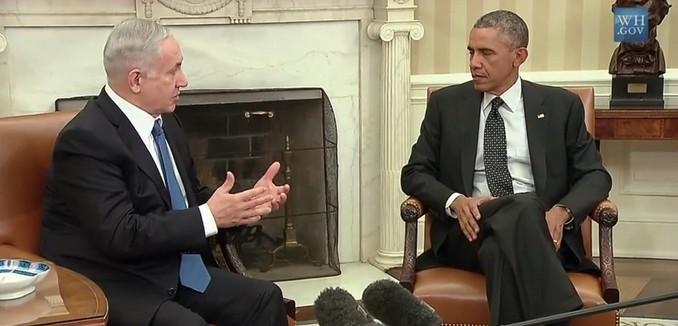In her column today, Washington Post columnist Jennifer Rubin described “a quiet diplomatic war behind the scenes” as a political divide grows between the Obama administration on one side, and Congressional leadership and America’s Middle East allies, including Israel, on the other.
Rubin identified three recent episodes as highlighting this divide.
First was President Barack Obama’s threat during his State of the Union address Tuesday night to veto a proposed bill sponsored by Senators Robert Menendez (D – N.J.) and Mark Kirk (R – Ill.), which would enhance the West’s negotiating position with Iran. At a committee hearing the next day, Menendez said that the administration’s arguments about diplomacy with Iran sounded “like talking points that come straight out of Tehran.” Rubin stated that at that hearing, “The administration also admitted it was no longer committed to preventing Iran’s nuclear breakout, a fundamental component of U.S. policy.”
The second episode was the invitation of Speaker of the House of Representative John Boehner (R – Ohio) to Prime Minister Benjamin Netanyahu to address a joint session of Congress, now scheduled to take place on March 3, where he will discuss the Iranian threat. Rubin points out that despite past promises to work with Congress on Iran’s nuclear program, the administration has more recently said that it wishes to exclude Congress from any role in a final deal with Iran.
Finally, Rubin reported that a furor erupted over a report that Israel’s external security agency, the Mossad, has vehemently argued against further toughening of diplomacy with regard to Iran. But in an “unprecedented” statement, the head of the Mossad, Tamir Pardo in fact argued, “that the negotiations with Iran must be conducted using ‘carrots and sticks,’ and the ‘sticks’ are currently missing.”
Rubin concluded:
What is certain is that the administration wants a deal so badly it wants no interference from anyone. Congress, the large majority of Americans, Israel (our closest ally in the Middle East) and the Sunni states understand that there will be no deal, only capitulation, unless pressure is increased on Iran. This is arguably the most serious break in U.S.-Israeli relations ever, a break that stems from a president who has the worst relationship with Israel since its founding. That it spilled over into the public tug and pull is a message of how badly relations have ruptured. Congress needs to act promptly to maintain solidarity with our allies and to stave off a catastrophically dangerous deal.
On Sunday, the editors of The Washington Post reversed their position and called for greater pressure to be brought against Iran.
[Photo: The White House / YouTube ]




